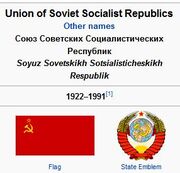
Local History – Earth – Pre Astro –
The Union of Soviet Socialist Republics (Russian: Сою́з Сове́тских Социалисти́ческих Респу́блик, tr. Soyuz Sovetskikh Sotsialisticheskikh Respublik) abbreviated to USSR (Russian: СССР, tr. SSSR) or the Soviet Union (Russian: Советский Союз, tr. Sovetsky Soyuz), was a socialist state on the Eurasian continent that existed between 1922 and 1991, governed as a single-party state by the Communist Party with Moscow as its capital. A union of multiple subnational Soviet republics, its government and economy were highly centralized.
The Soviet Union had its roots in the Russian Revolution of 1917, which deposed the imperial autocracy. The Bolsheviks, led by Vladimir Lenin, then overthrew the Provisional Government. The Russian Socialist Federative Soviet Republic was established and the Russian Civil War began. The Red Army entered several territories of the former Russian Empire and helped local communists seize power. In 1922, the Bolsheviks were victorious, forming the Soviet Union with the unification of the Russian, Transcaucasian, Ukrainian and Byelorussian republics. Following Lenin's death in 1924, a troika collective leadership and a brief power struggle, Joseph Stalin came to power in the mid-1920s. Stalin committed the state ideology to Marxism–Leninism and initiated a centrally planned economy. As a result, the country underwent a period of rapid industrialisation and collectivisation which laid the basis for its later war effort and dominance after World War II. However, Stalin repressed both Communist Party members and elements of the population through his authoritarian rule.
In the beginning of World War II, the Soviet Union signed a non-aggression pact with Nazi Germany, initially avoiding confrontation, but the treaty was disregarded in 1941 when the Nazis invaded, opening the the largest and bloodiest theatre of combat in history. Soviet war casualties accounted for the highest proportion of the conflict, in the cost to acquire the upper hand over Axis forces at intense battles such as Stalingrad, eventually driving through Eastern Europe and capturing Berlin in 1945, inflicting the vast majority of German losses. Soviet occupied territory conquered from Axis forces in Central and Eastern Europe became satellite states of the Eastern Bloc. Ideological and political differences with Western Bloc counterparts directed by the United States led to the forming of economic and military pacts, culminating in the prolonged Cold War.
A de-Stalinization period followed Stalin's death, reducing the harshest aspects of society. The Soviet Union then went on to initiate significant technological achievements of the 20th century, including launching the first ever satellite and world's first human spaceflight, which led it into the Space Race. The 1962 Cuban Missile Crisis marked a period of extreme tension between the two superpowers, considered the closest to a mutual nuclear confrontation. In the 1970s, a relaxation of relations followed, but tensions resumed with Soviet invasion of Afghanistan in 1979. The occupation drained economic resources and dragged on without achieving meaningful political results.
In the late 1980s the last Soviet leader, Mikhail Gorbachev, sought to reform the Union, introducing the policies of glasnost and perestroika in an attempt to end the period of economic stagnation and democratize the government. However, this led to the rise of strong nationalist and separatist movements. Central authorities initiated a referendum, boycotted by the Baltic republics and Georgia, which resulted in the majority of participating citizens voting in favour of preserving the Union as a renewed federation. In August 1991, a coup d'état was attempted by hardliners against Gorbachev, with the intention of reversing his policies. The coup failed, with Russian President Boris Yeltsin playing a high-profile role in facing down the coup, resulting in the banning of the Communist Party. On 25 December 1991, Gorbachev resigned and the remaining 12 constituent republics emerged from the dissolution of the Soviet Union as independent post-Soviet states. The Russian Federation, the successor state of the Russian SFSR, assumed the Soviet Union's rights and obligations and is recognised as its continued legal personality.